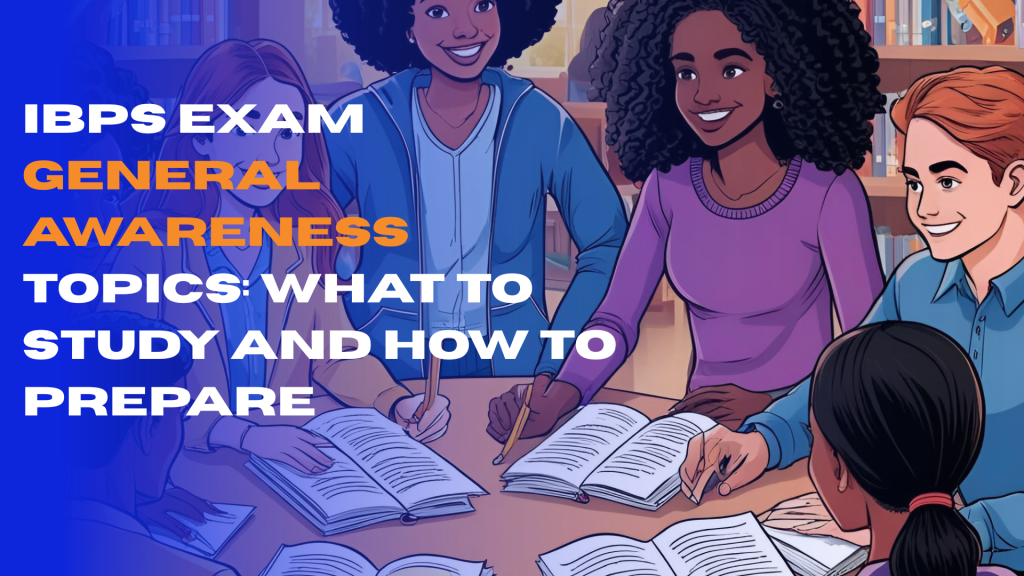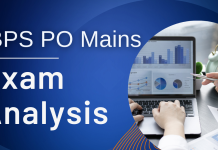General Awareness (GA) may be a scoring section of the IBPS exam, but for most candidates, it is also one of the most challenging. While in subjects like Quantitative Aptitude or Reasoning you can practice and get better with formulas and shortcuts, GA is all about being current with the latest happenings, policies, and banking-related news. The syllabus is vast, ranging from banking and financial awareness to current events, government plans, and economic news.

Most of the candidates commit the error of leaving this section to the last minute, expecting to stuff all the material into a few days. That does not pay off mostly. The trick to performing well in GA is steady preparation and intelligent revision strategies. But how do you begin? What should you study? Let’s divide it up.
Why General Awareness is Necessary for IBPS
The General Awareness section is extremely important in the IBPS Mains exam. Not only does it contribute to good marks, but it also gives a major boost to your overall rank. While sections such as Quant and Reasoning take time to calculate, GA questions can be solved in seconds—given that you possess the correct knowledge. A good GA score can be the difference between clearing the exam and falling short by a small margin.
Since there is no calculation or problem-solving involved in this section, it is neglected in favor of quantitative subjects. But don’t forget, scoring high in GA demands consistent effort. You cannot bank on last-minute cramming since it is not possible to cover months of current affairs within a few days.
Now, let’s discuss the actual topics you have to cover.
General Awareness Topics You Must Cover for IBPS
The GA section of IBPS exams mainly deals with the following topics:
Banking & Financial Awareness
Financial awareness is necessary since the IBPS exam is for the banking industry. Give emphasis to:
- RBI policies such as Repo Rate, Reverse Repo Rate, CRR, SLR.
- Key banking terminologies such as NPA, Basel Norms, Financial Inclusion, and Digital Banking.
- Latest developments by regulatory authorities like RBI, SEBI, NABARD, and IRDAI.
- Merger and acquisitions in the finance and banking sector.
- Principal banking programs like Jan Dhan Yojana, Mudra Yojana, and all other financial inclusion initiatives.
Current Affairs (Last 6 Months Are Important!)
- Important national and international news happenings.
- Government schemes and policies.
- Union Budget and highlights of Economic Survey.
- Major awards and honours.
- Defence agreements, space expeditions, and government MoUs.
Static General Knowledge
- Capitals, countries, and currencies.
- National parks, rivers, dams, and significant geographical points.
- Firsts in India – First digital bank, first woman pilot, etc.
- Headquarters of international organizations such as WHO, IMF, World Bank, etc.
Economy & Budget
- GDP growth rate, inflation, and fiscal deficit trends.
- Common economic terms such as fiscal deficit, current account deficit, trade deficit.
- Union Budget – Key highlights, allocations, and policy changes.
- Government initiatives pertaining to economic growth and disinvestment.
Government Schemes & Policies
- Welfare programs like PM Awas Yojana, Startup India, Digital India, and Make in India.
- Rural as well as farm-oriented programs such as PM-KISAN, MGNREGA.
- Social security schemes such as Beti Bachao Beti Padhao, Ayushman Bharat.
How Not to Get Distracted by the Huge Syllabus
Many aspirants feel lost when they look at the sheer volume of topics under GA. With so much information available, it’s natural to feel confused about what to study and what to skip. Here are some strategies to stay focused without feeling overwhelmed:
Stick to Reliable Sources
Don’t waste time gathering information from too many sources. Opt for a couple of reliable sources like The Hindu, The Indian Express, RBI reports, and government websites. Following one or two good current affairs magazines or online sites is better than attempting to study from ten different sources.
Set Small, Daily Goals
Attempting to review the entire current events of a month in a single sitting is a poor thought. Instead, break down sensible day-by-day goals—for instance, reading headlines for 30 minutes and highlighting five key developments. This retains the workload easy to handle as well as keeping from information paralysis.
Update Weekly, Not Only One Day Before Exam
Revision is the secret to retention. Allocate one day a week to revise what you have learned. If you do not revise regularly, facts will fade from your memory, and it will become more difficult to remember them during the exam.
Prioritize High-Weightage Topics
Not all the topics in GA are of the same importance. Some topics, such as banking and financial awareness, are more significant than others. Focus on these high-scoring topics rather than wasting too much time on less important information.
Use Short Notes & Mind Maps
Rather than writing lengthy paragraphs, jot down key points in bullet form. Use flowcharts and mind maps to relate topics. This will make revision easier and quicker.
How to Prepare for General Awareness?
Since you now have a clear picture of what to study, let’s go through how to study smartly:
- Read Daily Without Fail
Develop the habit of reading. Newspapers such as The Hindu or The Indian Express are strongly advised. Pay attention to economy and banking news. - Make Your Own Notes
Rather than using readymade PDFs, note important points yourself. This will enhance recall and assist in rapid revision prior to the exam. - View Current Affairs Videos
If newspaper reading is dull, then watch daily or weekly news analysis videos. Several teachers give GA summaries in brief and exam-oriented form. - Try Mock Tests Frequently
Mock tests are the most effective method to monitor your preparation. Try at least 2-3 GA mock tests every week. This will assist in weak area identification and recall speed improvement. - Study Smarter, Not Merely Repeatedly
Blind revising without strategy is not going to assist. Make use of active recall strategies—self-test yourself, practice on GA quizzes, and attempt facts without referring to notes. It reinforces memory.
Final Words
General Awareness is not a tough section, but it does need consistent effort. In contrast to Quant and Reasoning, where you can practice more in the final days, GA needs consistent preparation for weeks and months. If you plan well, study from the correct sources, and revise frequently, you can easily score well in this section.
Rather than dreading GA, organize your preparation. Begin early, divide the syllabus into pieces, and tackle it in an organized manner. The more systematically you study, the less panicky you’ll be as your exam date looms near.
ixamBee specializes in providing expert guidance and resources for banking exams 2025, ensuring that you are well-prepared for the Upcoming Bank Exams like RBI Grade B, NABARD Grade B, IBPS SO, and more. Our courses align with the bank exam calendar 2024, covering all the essential topics. With a focus on the upcoming bank jobs, our Previous Year Papers, BeePedia, SSC CGL, SSC CHSL, SSC MTS and other Mock Tests are designed to help you excel in upcoming banking exams.
Also Read:
How to Prepare for Bank Exams Without Coaching: A Complete Guide
The Role of PFRDA in Regulating the Pension Sector in India













